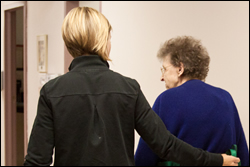Cardiopulmonary Diagnostics
Cardiac Stress Testing
A treadmill test for the investigation of chest pain, dyspnea and palpitations, which assists in the detection of ischemia for diagnostic and management purposes and assists in diagnosing abnormal exercise capacity,heart rate,blood pressure.
Cardiopulmonary Stress Testing
 A treadmill exercise test with a mouthpiece for the measurement of oxygen uptake and carbon dioxide production.
A treadmill exercise test with a mouthpiece for the measurement of oxygen uptake and carbon dioxide production.
Cardiopulmonary stress testing is a useful tool in the assessment of patients with cardiovascular and pulmonary disease. Oxygen uptake, carbon dioxide production, minute ventilation, and anaerobic threshold are measured. "VO² max" is the standard index of aerobic capacity and cardiopulmonary function.
Indications for Cardiopulmonary Stress Testing
- to assess exertional dyspnea to differentiate cardiac from pulmonary disease
- to provide post MI risk stratification
- to provide follow-up post CABG/PTCA for exercise prescription
- to provide fitness appraisal with VO2 max (maximal oxygen consumption)
- to determine the cause of exercise impairment
- to determine exercise capacity
- to identify abnormal responses to exercise
- to evaluate impairment/disability
- to assist with selection of patients for cardiac transplant
- to assist with pre-op risk stratification
Cardiopulmonary Bookings
Cardiac stress tests and cardiopulmonary stress tests (CPX) are booked by calling (613) 432-4851 ext.0. These tests require loose, comfortable clothing with running or soft-soled shoes. Patients are instructed to avoid caffeine, cream and heavy meals two hours prior to testing.
Echocardiography is scheduled through the Diagnostic Imaging Department at the Renfrew Victoria Hospital at 1-800-865-7713.
Pulmonary function tests are scheduled through the Respiratory Therapy Department of the Renfrew Victoria Hospital at 613-432-4851 extension 0.
Patients should be instructed to not take the following puffers prior to testing: Ventolin/bricanyl four hours prior to testing; atrovent eight hours prior to testing; and serevent/oxeze the day of the test.
Echocardiography
An ultrasound Doppler examination of the heart.
Useful in the diagnosis of:
- dyspnea
- heart murmur
- source of emboli
- pericardial effusion
Useful in the assessment of:
- systolic and diastolic function of the right and left ventricles
- valve function
- LV size in hypertension
Echocardiography is myocardial infarction will evaluate:
- wall motion
- clots
- ejection fraction
- effusions
- ruptures
Body Plethysmography
This state-of-the-art pulmonary function test consists of four components:
- Spirometry which assists with making differential diagnoses, and monitoring the course of a disease or response to therapy
- Airways Resistance which helps to differentiate central from peripheral airways disease. It is very sensitive to obstruction in central airways.
- Diffusion which helps to differentiate asthma from underlying emphysema, and intrinsic lung disease from an extra-pulmonary process.
- Lung Volumes which help to establish or confirm a diagnosis of restrictive/obstructive lung disease.